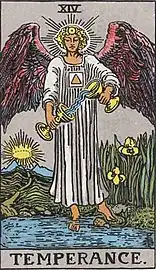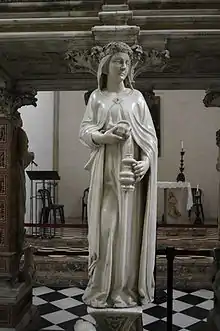Temperance (tarot card)
Temperance (XIV) is one of the 22 Major Arcana cards in Tarot decks. It is usually numbered 14. It depicts a figure which represents the virtue Temperance. Along with Justice and Strength, it is one of three Virtues which are given their own cards in traditional tarot.[1] It is used in both game playing and in divination.

Identity of the Figure
Temperance almost invariably depicts a figure with pouring liquid from one cup to another. This figure is usually referred to as the virtue Temperance or as an angel, though several other interpretations also exist. In particular, Paul Huson suggests that the figure once represented Ganymede, who served as cup bearer to Zeus.[2] Though it is possible that the figure could also be the goddess Iris or the archangel Michael.[1] The former of these interpretations is supported by the rainbow which is often added above her head and the fact that the flowers pictured in the Rider–Waite Tarot version of the card are Irises.[3]
Description
Temperance (Italian: La Temperanza) appears in the oldest Italian decks where it is numbered VI or VII. In the Tarot de Marseille and in most contemporary decks the card is numbered XIV. In the Thoth Tarot and decks influenced by it, this card is called Art rather than Temperance.[4]

Temperance is almost invariably depicted as a person pouring liquid from one receptacle into another. Historically, this was a standard symbol of the virtue temperance, one of the cardinal virtues, representing the dilution of wine with water. In many decks, the person is a winged angel, usually female or androgynous, and stands with one foot on water and one foot on land.
At the end of the path in the lower left part of the card, there is a crown to show the attainment of a goal, or mastery thereof.[5]
In the Rider–Waite image by Pamela Coleman-Smith (shown on this page) the Hebrew Tetragrammaton is on the angel's chest above the square and triangle. In the derivative Tarot decks this is usually not included.
According to A.E. Waite's 1910 book The Pictorial Key to the Tarot,[6] the Temperance card is associated with:
14.TEMPERANCE.--Economy, moderation, frugality, management, accommodation. Reversed: Things connected with churches, religions, sects, the priesthood, sometimes even the priest who will marry Querent; also disunion, unfortunate combinations, competing interests.
In Astrology, the Temperance card is associated with the masculine, mutable-fire sign of Sagittarius and its ruling planet, Jupiter.[7]
In Media
In the manga JoJo's Bizarre Adventure Stardust Crusaders, characters' powers (also known as 'Stands') are named after tarot cards. The Temperance 'stand' belongs to Rubber Soul, a minor antagonist.
In The House of the Dead, each of its bosses in the mainline series are named after the Major Arcana Tarot Cards (excluding The Devil.) The fourth boss of its fourth installment (Type 0483) is named after the Temperance card.
References
- Place, Robert (2005). the Tarot: History, Symbolism, and Divination (1st ed.). New York, New York: the Penguin Group. ISBN 1-58542-349-1.
- Huson, Paul (2004). Mystical origins of the tarot: From ancient roots to modern usage. Rochester, Vt: Destiny Books. ISBN 978-0-89281-190-8.
- O'Neill, R.V. (1986). Tarot Symbolism (1st ed.). Fairway Press.
- Scribes, Joanne Sacred. "TAROT - The Royal Road: 14 TEMPERANCE XIV". TAROT - The Royal Road. Retrieved 2015-09-16.
- Gray, Eden. "Complete Guide to the Tarot." 1970. Crown Publishers, New York, NY.
- Waite, Arthur Edward, 1857-1942. (2005). The pictorial key to the tarot. Mineola, NY: Dover Publications. ISBN 0-486-44255-1. OCLC 57549699.
{{cite book}}: CS1 maint: multiple names: authors list (link) - "A Taste of Tarot: Temperance & Sagittarius". Tarot.com. Retrieved 2023-07-14.
- A. E. Waite's 1910 Pictorial Key to the Tarot
- Hajo Banzhaf, Tarot and the Journey of the Hero (2000)
- Most works by Joseph Campbell
- G. Ronald Murphy, S.J., The Owl, The Raven, and The Dove: Religious Meaning of the Grimm's Magic Fairy Tales (2000)
- Juliette Wood, Folklore 109 (1998):15-24, "The Celtic Tarot and the Secret Tradition: A Study in Modern Legend Making" (1998)